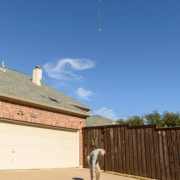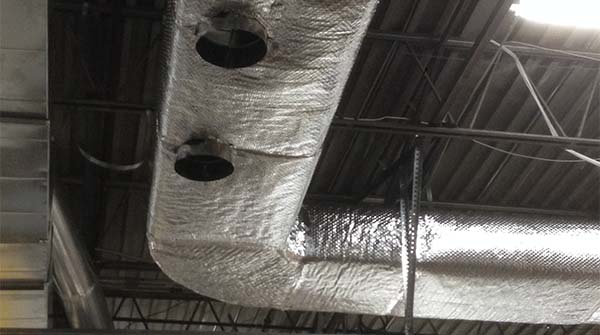We can install HVAC insulation virtually in all parts of the house, including the storage rooms, walls, attics, doors, flooring, and windows.
Many homeowners ignore their insulation and don’t provide proper maintenance or care if it is correctly installed. However, insulation is pretty helpful in the home. It helps to prevent heat loss and maintain a comfortable home. HVAC insulation can be installed in virtually all parts of the house. This includes the storage rooms, walls, attics, doors, floorings, and windows.
Why Is Insulation Necessary?
According to statistics, heating and cooling the home consumes more than 50% of the home’s energy costs. The more heat escapes freely from the house; the more energy is required to regulate the home’s temperature. However, insulating the home can help reduce the rate at which air leaves or enters the home and control heat loss. Therefore, HVAC insulation is essential, as it helps to control heat loss and reduce energy consumption.
How Does Heat Escape?
Heat escapes from the home through airflow. When air flows from a warmer place to a colder area, the colder area gets warm, while the warmer area loses its heat. This is called heat transfer. The same applies in the home. When heat from the house flows outside and the cool breeze outside flows inside, the house loses heat.
Interestingly, heat can escape from different parts of the home. It can escape from the walls, attic, basement, and even floor. Therefore installing insulation in these parts of the house is essential. Homeowners can also install exterior HVAC duct insulation wrap to improve the airflow barrier in the home.
What Areas in a Home Should Be Insulated?
As stated earlier, heat can escape from several places in the home. Therefore, when planning to insulate the house, it is essential to insulate all channels that allow heat loss. This includes:
- Attics
- Doors and Windows
- Chimney And Fireplace
- Walls
- Electrical Outlets And Plumbing Fixtures
- Floorings
Attic
The attic is among the first places that many homeowners insulate. This is because the attic is where most heat will flow towards. By installing insulation in the attic, homeowners can seal off some access point that allows airflow.
Doors And Windows
The doors and windows are another part of the home that needs to be insulated. In fact, insulating the interior and exterior of the doors and windows ensures they are adequately sealed. Installing duct insulation wrap will create adequate barriers to restrict airflow in and out of the home.
Chimney And Fireplace
The chimney and fireplace are structures designed to help keep the home warm. However, when not in use, they are channels that allow the free flow of air in and outside the home. The chimney and fireplace should be insulated to help control the escape of heat in the house. Installing a glass door in the fireplace will prevent air from escaping up the chimney. Also, air leakage can be reduced by replacing the old flue damper with a new rubber seal-creating damper.
Walls
Another delicate part of a building that allows air to move in and out freely is the walls. Therefore, the walls should not be left out when insulating the home. The wall surface and cavity can be insulated to help control heat loss. Installing exterior duct insulation will ensure complete sealing of the walls against heat loss.
Electrical Outlets And Plumbing Fixtures
Many homeowners neglect the electric outlets and plumbing fixtures when insulating the house. However, these are significant outlets that enable heat escape. Foam-insulating gaskets are perfect for insulating electrical outlets and plumbing fixtures. They are also pretty affordable.
Floorings
The floor is the largest surface in the house. It is also an outlet for heat loss in the home. This implies that the floors contribute significantly to heat loss and energy consumption in the home. Therefore, it is crucial to insulate the floorings when insulating the house.
How Insulation Improves The Home’s HVAC System’s Performance
Installing HVAC insulation in the home provides extra comfort in the house. It upgrades the home and helps the homeowner to save some money due to reduced energy consumption. However, it not only benefits homeowners but also helps to improve the performance of the HVAC systems in the home. Here are a few ways insulation can improve the home’s HVAC performance.
- Locks in temperature
- Reduces stress on the HVAC systems
- Reduces The Need For Repairs
- Ensures the HVAC systems last long
Locks In Temperature
As mentioned above, installing HVAC insulation helps reduce the rate at which heat escapes from escaping the home. This directly improves the HVAC system’s performance, as they will work more efficiently.
Reduces Stress On The HVAC Systems
During the winter, the HVAC systems have to work at their maximum to provide homeowners with the much-needed comfort they desire. The same applies during a hot summer afternoon. If the home is not insulated or has damaged insulation, the HVAC systems would have to work more than necessary. This could cause them to get damaged over time. Insulation ensures that heat escape is minimal. Therefore, installing insulation in the home helps to reduce the rate at which the HVAC systems need to work.
Reduces The Need For Repairs
Another benefit of installing insulation in the home is to reduce the need for frequent repairs. When the HVAC systems don’t always have to work at their maximum daily, they won’t break down frequently.
Ensures The HVAC Systems Lasts Long
Insulation also ensures that the HVAC systems last long. It is common for HVAC systems in homes without proper insulation to break down frequently. Frequent breakdowns and repairs will shorten the lifespan of the HVAC system. However, if the house is adequately insulated, the life span of the HVAC systems will be prolonged.
When insulating your building, it is essential to use reliable insulation materials. This guarantees that your insulation will be efficient and long-lasting. Contact us today for all your insulation needs. We are a division of Ulthane Research Ltd., providing high-quality HVAC duct Insulation, wall cavity insulation, and foundation concrete wrap. We also offer the best pipe wrap insulation attic and ceiling insulation in Canada.
Read: 5 Best PPC Ad Networks That HVAC Business Can Prefer

He is a librarian at Monash University. Besides handling several responsibilities of the library job, he has a great passion for writing blogs. His write-up is well-recognized by his readers.
-

1 Abandoned Cart Email Ideas for Shopify Retail Merchant
-

2 5 Things to Consider Before Developing an Apartment Building
-

3 Top Reasons You Need to Install a Misting System Today
-

4 7 Ways to Make Money with a Virtual Phone Number
-

5 Elon Musk Successfully Buys Twitter for $44 Billion
-

6 Update on the Twitter-Elon Musk Saga
-

7 Elon Musk Attempts to Buy Twitter says he Even has “Plan B” in Place
-

8 Sony Makes A Huge Investment in Epic Games
-

9 Successful Photography Business Secrets
-

10 Delivery Drones are the Next Big Thing – Manufacturers are Making Over 100 Per Day


